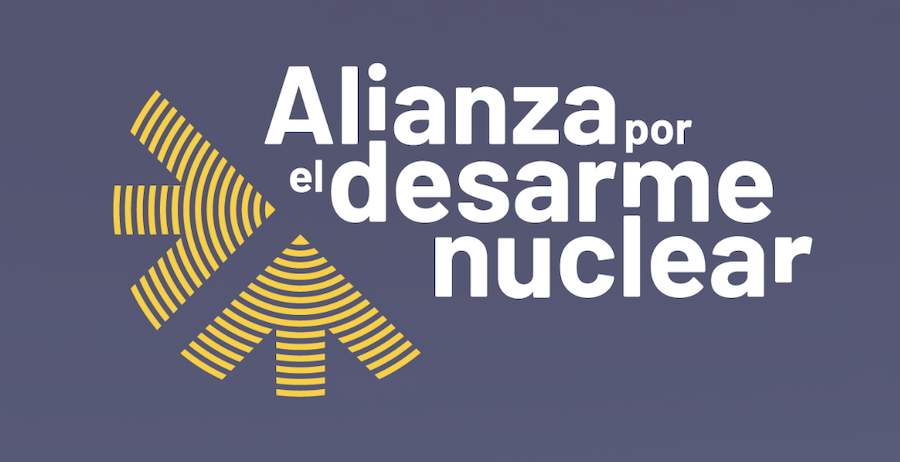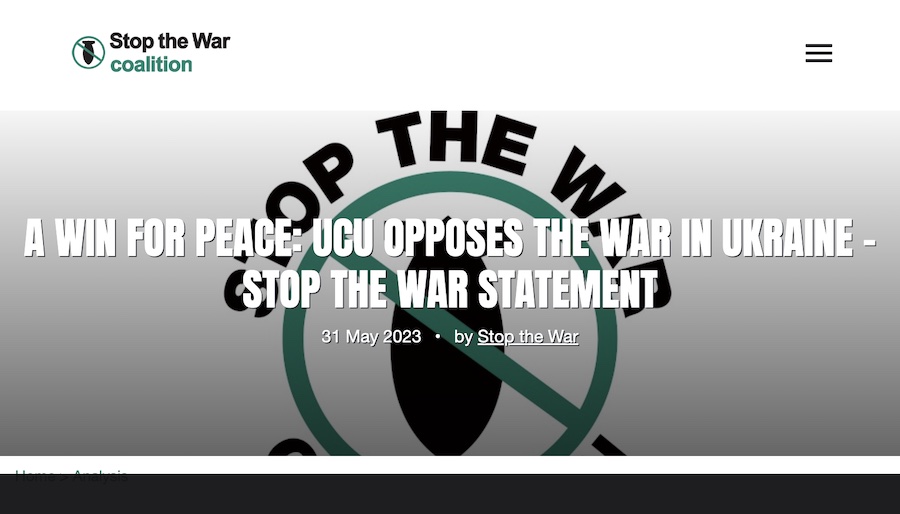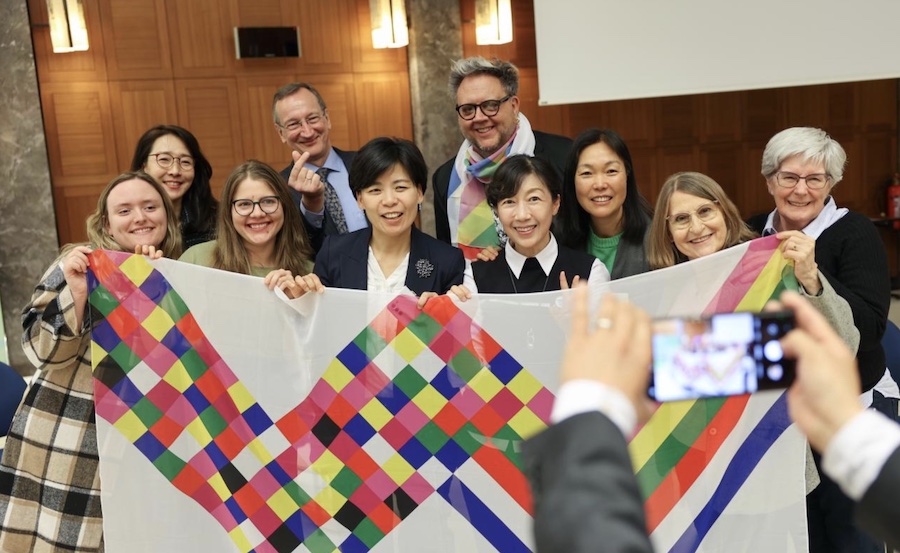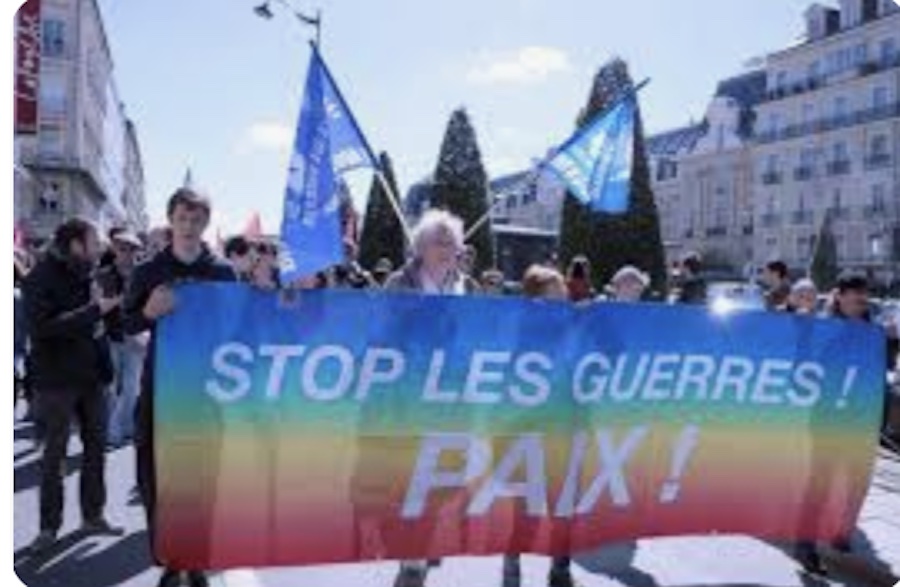FREE FLOW OF INFORMATION
An article by By David Swanson, Kathy Kelly, John Reuwern and Brad Wolf from World Beyond War
Forty-eight hours before a global peace conference in Vienna, Austria, was to begin, the venue host abruptly cancelled. Peace, it seems, cannot be discussed, especially peace in Ukraine.
This news is a disturbing step in a growing trend.
Owners of the venue which was to host the Summit for Peace in Ukraine, announced on Wednesday, 7 June, 2023, their decision to cancel the agreement holding the summit on their premises. Fortunately, a new location was secured in Vienna (and anyone on Earth can sign up to take part online), but not before a smear campaign against the summit had been launched.

The venue owners reportedly explained: “We have decided to comply with the wishes of Ukraine and its embassy operating in Austria and have cancelled the rental of all rooms in the ÖGB catamaran for the event ‘International Summit for Peace in Ukraine’ next weekend.”
This was not just one venue taking this position. “On Wednesday, the Press Club Concordia also refused to make its premises in a central location in downtown Vienna available for a press conference of the ‘summit’.”
Supporters of the summit note the chilling innuendo caused by the abrupt cancellation of the summit. Speakers widely regarded for their moral and intellectual guidance have been undermined in statements intended to justify objections to the summit.
This is not an isolated incident. Western liberal ideals have long asserted that the best answer to mistaken speech was wiser speech and more of it. We now have a rapidly growing liberal consensus in favor, instead, of censoring media outlets, canceling speaking events, and forbidding people with unwanted points of view from even gathering together. Powers are being granted to governments, social media platforms, and other tech corporations that believers in democratic self-governance spent centuries claiming nobody should have.
Those who turn against free speech are often groups afraid they cannot win an honest debate. And so, they take up censorship. The movement for peace in Ukraine can take this as a compliment. Governments fear such a discussion of peace and instead smear this peace summit and the speakers.
An Austrian press report announced on Thursday that the venue (ÖGB Catamaran) had been withdrawn because the event was “under suspicion of propaganda.” What sort of propaganda? Well: “According to its own statements, the ‘International Summit for Peace in Ukraine’ wanted to show ways out of the war.” Under international law, propaganda for war is illegal and must be banned. Not a single nation on Earth complies with that requirement, raising up the value of free speech as trumping the rule of law. But speaking in favor of bringing a war to an end has now acquired the status of forbidden propaganda.
Moreover, the report explains, “some announced participants have no current fear of contact with the media of the aggressor.” In other words, if talk of negotiating peace is shut out of the media controlled by only one side of a war, speaking to media controlled by the other side — even to say exactly what one would have said to any other media outlet — is grounds for not only censorship but a ban on meeting and strategizing.
(Article continued in the column on the right)
Free flow of information, How is it important for a culture of peace?
Can the peace movement help stop the war in the Ukraine?
How can we be sure to get news about peace demonstrations?
(Article continued from the column on the left)
The report gives some specifics: “The internationally prominent U.S. economist Jeffrey Sachs, for example, as well as Anuradha Chenoy, ex-dean of India’s Jawarharlal Nehru University and an important representative of global civil society networking, have given interviews to the TV station Russia Today (RT). The channel has been blocked across the Union for Russian war propaganda in the wake of EU sanctions. Sachs also answered questions from Russian TV host and war advocate Vladimir Solovyov in December 2022. Solovyov has often called for attacking Germany and Great Britain as well.”
The “Press Club Concordia” also explained that the problem was that Jeffrey Sachs might do an interview on Russian media.
Not only is diplomacy shunned, but speaking to members of the media with whom one disagrees is equated with advocating whatever those journalists have advocated. This can only contribute to distrust, enmity, and war without end.
Not only did the venue say it was doing the wishes of the Ukrainian embassy, but the Ukrainian ambassador to Austria tweeted that peace activists were the fifth column and henchmen of the Russian government.
And who created the idea that the whole world must obey the wishes of the government of Ukraine? The government of the United States — a country where little time passes these days without news of some event cancelled to fulfill the wishes of the government of Israel.
Further, “Noam Chomsky, who will speak at the summit via video, for example, believes that NATO has ‘marginalized’ Russia for too long.” Whether that fact is in dispute, or merely the acceptability of stating it out loud, was not explained.
“Also physically present in Vienna, according to the program, should be Clare Daly, an Irishwoman and member of the EU Parliament and the parliamentary group Die Linke. Daly also spoke repeatedly to RT about the West’s ‘complicity’ in the war in Ukraine. She believes the sanctions are wrong: they would not harm Russia and would not help Ukraine. In the EU Parliament in early 2023 voted against a resolution holding Russia legally responsible for the war. Daly said she does support those parts of the text that condemn Russia for the invasion and call on the government in Moscow to immediately cease all military action and withdraw from Ukraine. However, she said she opposes providing weapons to Ukraine and expanding NATO’s presence in the region.”
So, opposing both sides of a war is just as unacceptable as opposing one side, in the view of these censors.
This is where we have arrived. Proposing to negotiate peace — without even suggesting what those negotiations should arrive at — is so unacceptable to proponents of war, that it cannot be discussed — not in any large gathering. And yet, despite the wars being waged in the name of “democracy” it is not clear how such censorship is driven by democracy or in align with democratic values. Nor is it clear how many steps, if any, remain between the varieties of censorship we have now and hardcopy book burnings of the past.
(Editor’s note: We were informed on June 13 that “the websites for the International Peace Bureau and the Peace in Ukraine summit were hacked the day after the conference but should be up and running soon.”)








